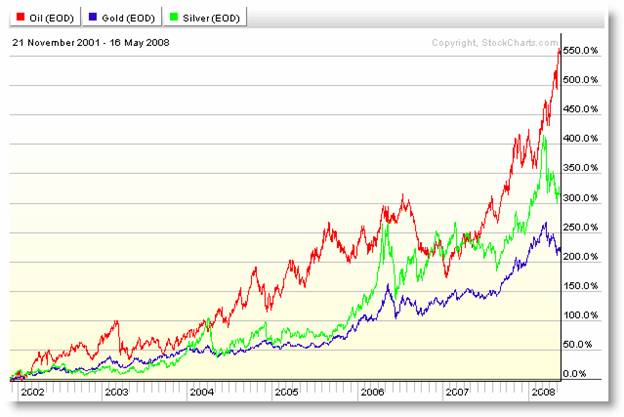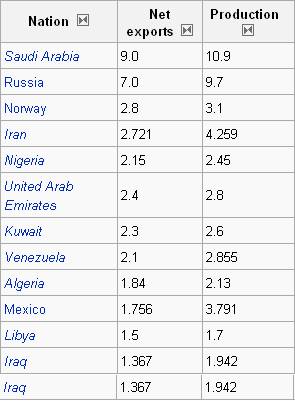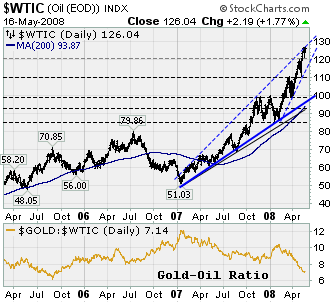Crude Oil Spikes to New High on Emerging Markets Demand- Part 1 of 2
Commodities / Crude Oil May 20, 2008 - 12:48 PM GMT The oil price has in the past few years been a major influence on the gold price and quite rightly too. Both represent an unalterable definer of power and value. But of late the gold price has lagged the oil price in its relationship with oil. We see this as a temporary situation, which will persist until the ‘big' global picture forces itself onto the realities of our daily life in our local communities.
The oil price has in the past few years been a major influence on the gold price and quite rightly too. Both represent an unalterable definer of power and value. But of late the gold price has lagged the oil price in its relationship with oil. We see this as a temporary situation, which will persist until the ‘big' global picture forces itself onto the realities of our daily life in our local communities.
Once this happens we believe that the gold and silver price will catch up and reassert itself, not as a ‘gold standard' [after all governments will manage such a system as it currently does paper currencies] but as a measure of value and power in the monetary system [more on that in future articles]. So in this piece we look at the oil crisis, which is not fully appreciated by its audience, staring us in the face.
For many years now we have included in our weekly service a section we have persistently called ‘The Oil Crisis'. This began in the days of yesteryear, when oil prices were around $50 a barrel and the industry was telling us prices would not rise because there was more than sufficient oil to go round to all who wanted it. When was that? That memory is lost in the midst of time somewhere near the end of last century?

The oil price is around $128 a barrel. As recently as last year we were being told that the price would probably not make it over $100. Now we are being told there's plenty of oil, so the oil price should drop to $100 or lower. These platitudes are sounding pretty empty as we are told that O.P.E.C. is not supplying any more than they are at present. And still the oil price goes up. What is not clear is the long-term effects of an oil price forecast to move as high as $200 a barrel. This will be a major crisis in itself.
Who is Benefiting from the High Oil Prices?
Oil Producers
Table reflects 2006 Production Figures
 Russia - It is clear that because of the huge taxation of Russia's oil producers [netting out at around 92% for the government] there is little incentive to develop new fields, despite the fact that Russia could more than double its oil production based on total reserves [including current oil producing fields] of around 180 billion barrels. Few companies want to subsidize the Russian government with fresh investment. Anyway it would still take some years before such developments, [were they started today], could begin producing oil.
Russia - It is clear that because of the huge taxation of Russia's oil producers [netting out at around 92% for the government] there is little incentive to develop new fields, despite the fact that Russia could more than double its oil production based on total reserves [including current oil producing fields] of around 180 billion barrels. Few companies want to subsidize the Russian government with fresh investment. Anyway it would still take some years before such developments, [were they started today], could begin producing oil.
In April, Russian oil production fell for the fourth month in a row. It is now over 2% below the peak of 9.9m barrels a day (b/d) reached in October last year. This is a continuation of a slowing pattern of production that began last year. The industry believes that Russia's production will never top 10m b/d.
So, Russia is out of the running as a source of new supplies in the near term. It is reasonable to assume then that Russia's government will want to see oil prices rise more, so their oil income will benefit accordingly.
Saudi Arabia - Irrespective of the reserves it has and the added fields now coming into production Saudi Arabia has lost the appetite for increasing oil supplies to a world that it believes has sufficient supply, simply to bring down the price. So we would be surprised if President Bush came away with any more than a face-saving gesture from the Saudis in response to his request for more oil.
Other oil producers – Whether Middle Eastern, South American or Canadian, etc, oil producers, all of them are happy to receive the far higher levels of payment than they could have ever imagined now, as they represent considerably more power and influence than they previously had. As a result there is no incentive sufficient to counter national interests that could persuade them to lower prices.
Indeed O.P.E.C. is presently happy with the market situation; for there are many moves that oil users can make to reduce the cost of fuel and oil should they wish to do so. They can halt speculation in oil, which would return a great volume of oil to the market for consumption, which would lower oil prices, but it would also mean to go against the Free Market principles that shape the entire developed world.
Why Prices are Still Rising and Demand Still not Falling
Today oil prices are rising on a smooth steady path to higher levels at a steady sprint, despite the reassuring words from so many that prices must come down. The seventies pale into a minor crisis compared to what lies just ahead of us now. Why? Because the developed world, in the 1970's, was all powerful and could, behind closed doors, lean on the Middle East and make them realize that they needed the developed world to maintain their own sovereign integrity as well as to have happy customers. President Bush attempted to reinforce this perception in ‘Desert Storm' and in Iraq. But the globe has changed in the last few years.
 Half the world's population is now emerging out of their poverty onto a plain where they need oil just as much as the developed world. $2,500 cars are now becoming available in China and India and the rest of Asia, on top of a steady 10% GDP growth per annum designed to continue for the next decade at least, confirming that demand for oil will not slow at all but continue to increase still more.
Half the world's population is now emerging out of their poverty onto a plain where they need oil just as much as the developed world. $2,500 cars are now becoming available in China and India and the rest of Asia, on top of a steady 10% GDP growth per annum designed to continue for the next decade at least, confirming that demand for oil will not slow at all but continue to increase still more.
Now all oil producers have a choice of customers and are certain that the demand will remain at a level where supply is met by just enough demand to balance it, irrespective of the price. It's tough on those nations who can't afford these prices! And what are we seeing? Oil demand has become remarkably price insensitive, as if its pricing mechanism has broken down in large parts of the world.
• Only in the US and a few small countries is there still an efficient market transmission mechanism operational. With minimal tax burdens on their oil products, crude oil prices do drive pump prices, changing demand dynamics. Even so, US oil demand is barely down 2% so far.
• Europe has so heavily burdened oil products with indirect taxes that changes in crude oil prices have minimal impact on pump prices and therefore demand. Their public transport systems are well developed and have in the past as well offered an acceptable alternative to using one's own car.
• In some fast-growing emerging markets in Asia, consumers are shielded from crude price changes through elaborate subsidies and price controls. Oil users have no incentive to change their demand if they don't experience changing prices.
• In many oil-producing countries like Saudi Arabia, crude for domestic use is priced at $10/b. In the Persian Gulf, a liter of coke costs more than one of petrol.
All these market structures have to change first before any semblance of a true demand/supply pressure situation impacts the oil price. So global oil demand rises higher and higher now at 85 million barrels daily. It will move up and down on a seasonal basis and when some national users make short-term efforts to reduce demand. These will give way to satisfy internal demand eventually.
 The threats that this situation implies will have investors turning to precious metals as a haven in the storms that are certain to come.
The threats that this situation implies will have investors turning to precious metals as a haven in the storms that are certain to come.
In the second part of this article we look at why supply is not rising with higher prices, then the ripple-effect and consequent crises that will stem from the oil crisis as well as summarize the effect on Gold and Silver prices.
For the entire report please visit www.GoldForecaster.com
![]()
By Julian D. W. Phillips
Gold-Authentic Money
Copyright 2008 Authentic Money. All Rights Reserved.
Julian Phillips - was receiving his qualifications to join the London Stock Exchange. He was already deeply immersed in the currency turmoil engulfing world in 1970 and the Institutional Gold Markets, and writing for magazines such as "Accountancy" and the "International Currency Review" He still writes for the ICR.
What is Gold-Authentic Money all about ? Our business is GOLD! Whether it be trends, charts, reports or other factors that have bearing on the price of gold, our aim is to enable you to understand and profit from the Gold Market.
Disclaimer - This document is not and should not be construed as an offer to sell or the solicitation of an offer to purchase or subscribe for any investment. Gold-Authentic Money / Julian D. W. Phillips, have based this document on information obtained from sources it believes to be reliable but which it has not independently verified; Gold-Authentic Money / Julian D. W. Phillips make no guarantee, representation or warranty and accepts no responsibility or liability as to its accuracy or completeness. Expressions of opinion are those of Gold-Authentic Money / Julian D. W. Phillips only and are subject to change without notice.
Julian DW Phillips Archive |
© 2005-2022 http://www.MarketOracle.co.uk - The Market Oracle is a FREE Daily Financial Markets Analysis & Forecasting online publication.



